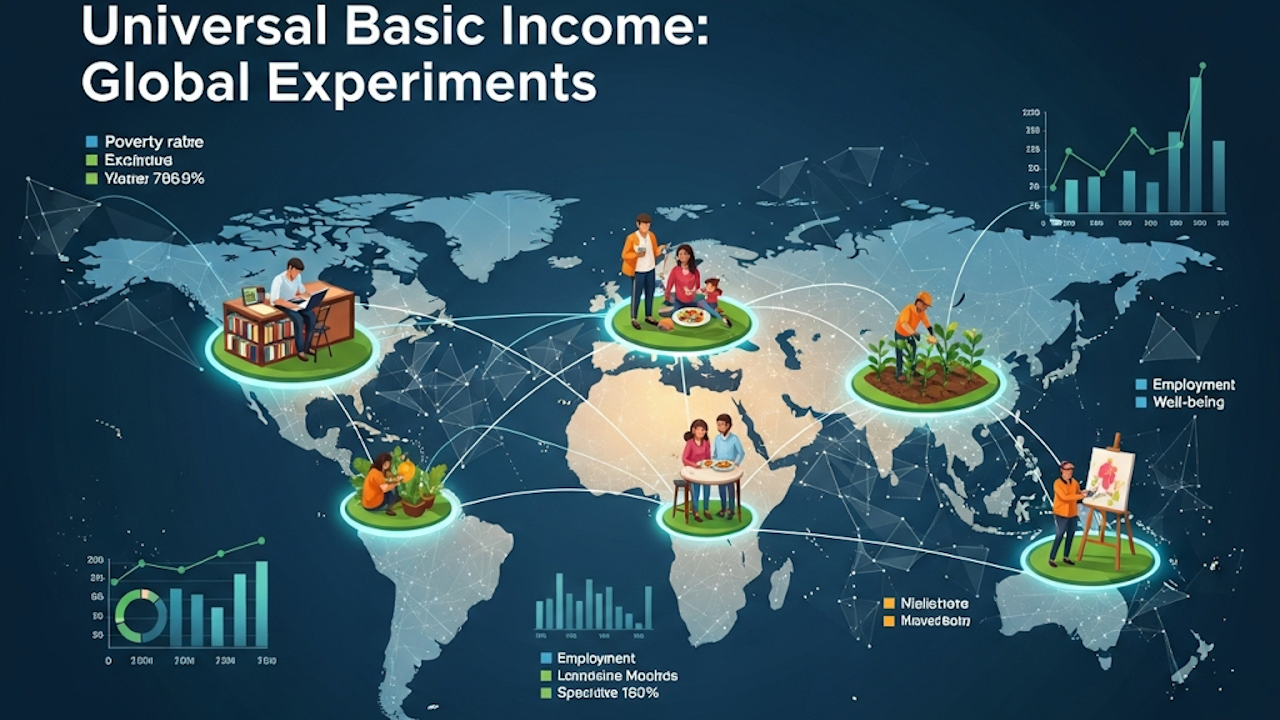Universal Basic Income (UBI) is a policy proposal that provides all citizens with a regular, unconditional sum of money regardless of employment status or income level. The idea is simple but powerful: offer a financial safety net that enables individuals to meet basic needs, support freedom of choice, and reduce poverty. In recent years, interest in UBI has surged as automation, precarious employment, and income inequality have drawn more attention. Around the world, various countries and regions have undertaken UBI experiments to test its feasibility and impact. These trials provide a rich source of information for policymakers considering broader implementation.
One of the most notable early experiments took place in Finland between 2017 and 2018. The Finnish government provided 2,000 unemployed individuals with a monthly payment of €560, free from any requirement to seek work or report earnings. The primary objective was to examine whether UBI could improve employment and well-being. Results showed that while employment effects were modest, participants reported higher levels of happiness, reduced stress, and improved trust in institutions compared to the control group. This highlighted UBI’s potential to improve quality of life, even if labor market impacts were limited in the short term.
Canada also tested a form of basic income with the Ontario Basic Income Pilot launched in 2017. The project provided up to CAD 17,000 per year for individuals, with slight deductions for employment income. The trial was intended to run for three years but was prematurely canceled in 2019 due to a change in provincial government. Despite its early termination, researchers collected valuable data during the period it was active. Participants reported improved physical and mental health, better food security, and more stable housing. Many used the money to pursue education, start businesses, or escape abusive situations. These outcomes suggest that UBI can empower recipients to make choices that improve their long-term well-being.
In Kenya, the nonprofit organization GiveDirectly has been conducting one of the most ambitious UBI experiments to date. Funded through private donations, the trial spans over a decade and covers more than 20,000 people in rural communities. Participants receive monthly payments of around $22, an amount small by Western standards but significant in the Kenyan context. Early results indicate improvements in nutrition, child health, education, and household investment. Unlike short-term trials, this long-term approach offers insight into how sustained unconditional income affects development over time. The Kenyan project is especially useful for understanding how UBI works in low-income settings.
The United States has also witnessed several localized trials. Stockton, California launched the Stockton Economic Empowerment Demonstration (SEED) in 2019. A group of 125 residents received $500 per month for two years. Findings showed that recipients used the money primarily for necessities such as food, utilities, and car repairs. Importantly, full-time employment among participants increased compared to a control group. The financial cushion appeared to help people stabilize their lives and pursue better opportunities. The success of SEED has inspired other cities, including Los Angeles and Chicago, to pilot similar programs.
Other global examples include pilot programs in India, Brazil, Germany, and South Korea. In India, a UBI pilot in the state of Madhya Pradesh reached thousands of villagers and showed improvements in nutrition, health, and school attendance. Brazil’s Bolsa Família, while not a pure UBI, provides conditional cash transfers that have significantly reduced poverty. Germany’s nonprofit-led trial launched in 2020 offers recipients €1,200 per month for three years and is ongoing. South Korea has experimented with youth basic income in Gyeonggi Province, where young adults receive small quarterly payments to support autonomy and entrepreneurship.
While UBI experiments vary in scope, duration, and design, some consistent themes emerge. First, recipients often experience improvements in well-being, mental health, and financial security. Second, contrary to fears that people will stop working, many continue to seek employment or pursue education and caregiving. Third, UBI provides people with the flexibility to make better decisions for themselves and their families, whether by leaving abusive relationships, investing in small businesses, or taking time for skill-building.
Critics of UBI argue that it is expensive, might disincentivize work on a larger scale, and could divert resources from targeted welfare programs. Supporters counter that technological advances and increasing productivity can fund UBI through taxes on wealth, carbon emissions, or automation. Moreover, by reducing the administrative complexity of existing welfare systems, UBI may save money and reduce stigma.
As global experiments continue, more data will become available to assess UBI’s long-term effects. What is clear so far is that UBI can improve lives in tangible ways and may offer a viable solution to some of the socioeconomic challenges of the 21st century. Although a full-scale implementation remains rare, ongoing trials across diverse settings suggest that UBI is not a utopian fantasy but a policy idea worth serious consideration. The growing body of evidence from around the world will be instrumental in shaping the future of basic income.

